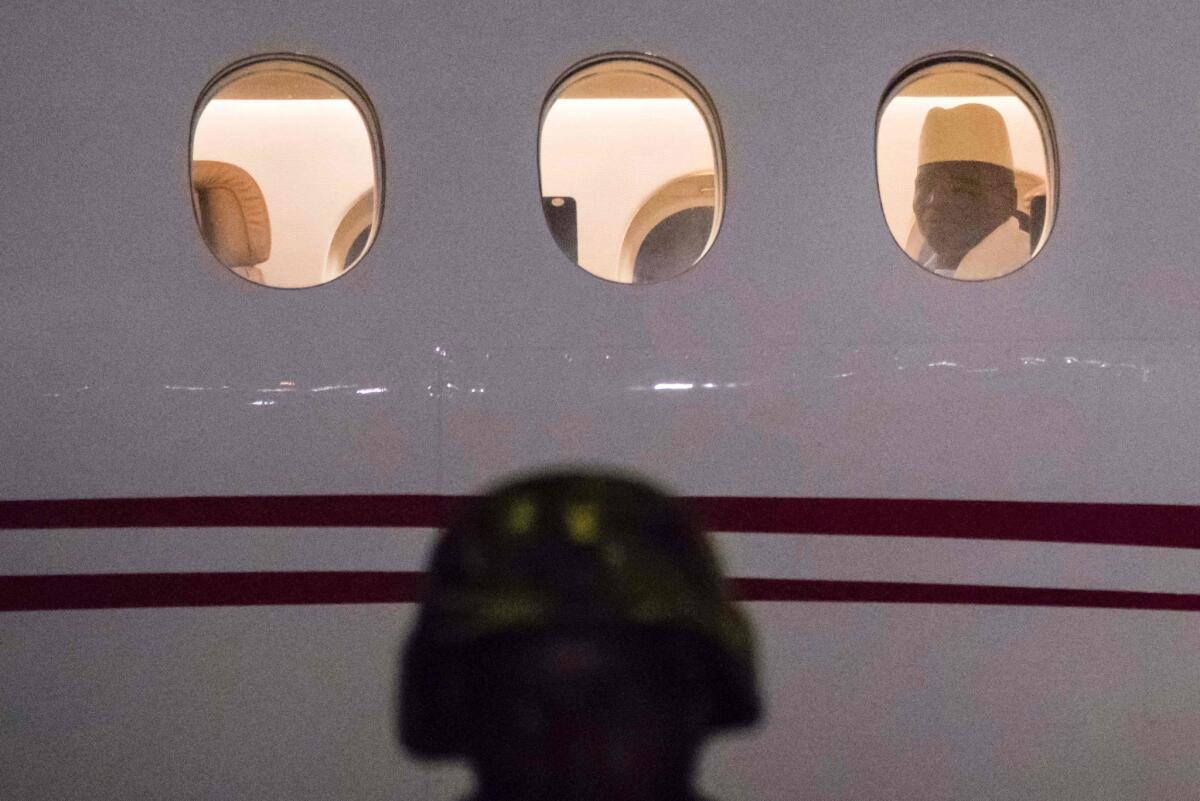In a final insult, Gambiaâs ex-leader looted millions of dollars, his successor says

Reporting from Johannesburg, South Africa â The last act of a dictator who ruled his country for 22 years was massive embezzlement, according to the new government of Gambia, where Yahya Jammeh was forced to give up power under West African military and diplomatic pressure.
Jammeh tried to cling to power after losing elections last month, but neighboring West African leaders wouldnât allow it. Their intervention represented a significant boost for democracy on a continent where many presidents try to rule for life.
But Mai Ahmed Fatty, advisor to the new president, Adama Barrow, said at a news conference Sunday that experts in the ministry of finance had determined that Jammeh withdrew more than $11.4 million from banks in the past two weeks before fleeing to exile in Equatorial Guinea.
âAs we take over the new government, the Gambia is in financial distress. The coffers are virtually empty,â he said. Fatty said Jammeh also managed to squeeze numerous luxury cars onto his plane.
With Jammeh out of the country, the chances of Gambia recovering the money seem remote.
In theory, the United States could use the 2015 Magnitsky Act, which enables U.S. authorities to seize the property of any foreign government official responsible for stealing public money or human rights abuses, to confiscate Jammehâs multimillion-dollar mansion in Potomac, Md.
In addition to being implicated in the theft of state funds, Jammeh, who seized power in a 1994 coup, has also been accused by human rights groups of serious human rights abuses, including jailing and âdisappearingâ political opponents and critics without trial.
In recent years, African governments have pressed Western governments and banks â with some success â to help recover billions in public funds looted by dictators. In March last year for example, Switzerland reached agreement with the Nigerian government to return $321 million of the billions looted by former military dictator Sani Abacha. It had previously repatriated more than $720 million of money stolen by corrupt officials to Nigeria.
In comparison, Jammehâs purported last-minute withdrawals may seem modest â but they amount to more than 1.2% of his countryâs annual gross domestic product.
The Magnitsky Act â named after a Russian lawyer who died in prison after he was jailed for exposing a $230 million tax scam by Russian officials â was one of many irritants that saw relations between the U.S. and Russian governments deteriorate sharply.
But the law requires a decision by the U.S. president on any seizure of foreignersâ property. Although itâs too early to tell, President Trump has shown little interest in African affairs, and may see little reason to help out a tiny West African country of no strategic interest.
Like Jammeh, President Teodoro Obiang of Equatorial Guinea has ruled his country for decades and has been accused of jailing opponents, crushing dissent and ruling by fear. His son, Teodorin Nguema Obiang, is on trial for corruption and money laundering in absentia in France, where he owns a Paris mansion and numerous luxury cars.
In 2014, Teodorin Obiang had to forfeit his Malibu mansion, a Ferrari and items in his collection of Michael Jackson memorabilia, valued at $34 million, after the U.S. Department of Justice took action to seize his assets, alleging corruption.
Equatorial Guineaâs opposition attacked the decision to shelter Jammeh, saying he didnât qualify for asylum because he triggered Gambiaâs crisis when he refused to step down, the Associated Press reported.
âWe are not against Pan-Africanism, but we are in favor of a more objective Pan-Africanism that does not consist in just bringing over the waste of Africa,â the Democratic Opposition Front said in a statement.
ECOWAS, the leadership group of West African nations, offered Jammeh immunity from prosecution and exile if he agreed to leave power. When he rejected the deal, the group sent in a military force late Thursday. Mediators finally persuaded Jammeh to agree to step down Friday and he flew out Saturday.
Barrow remains in neighboring Senegal, while West African troops stabilize the country, ensuring it is safe for him to return. Senegalese forces, part of the West African force, have taken control of the presidential residence in the Gambian capital, Banjul.
Fatty told journalists Barrow would return to Gambia as soon as possible.
Twitter: @RobynDixon_LAT
ALSO
Gambian leader who once said only God could remove him cedes power under military pressure
Itâs a bird! Itâs a plane! Therein lies the problem at Lebanonâs international airport
More to Read
Sign up for Essential California
The most important California stories and recommendations in your inbox every morning.
You may occasionally receive promotional content from the Los Angeles Times.










